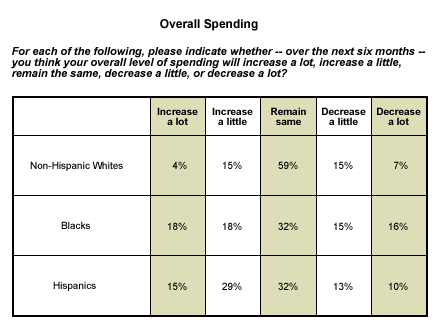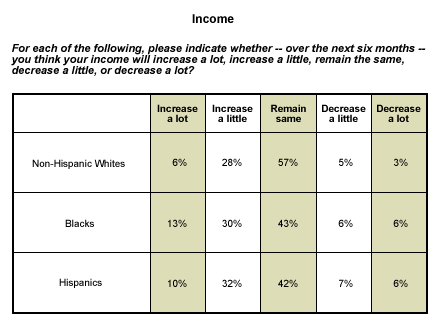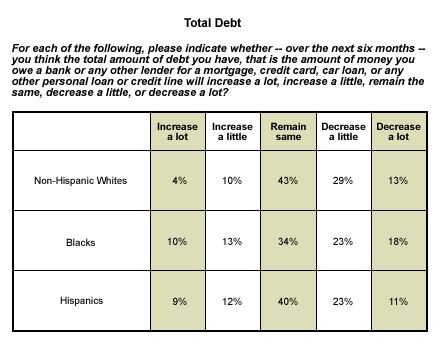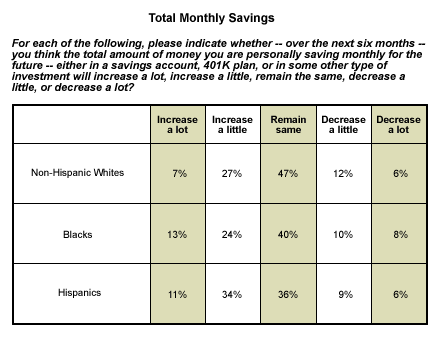In the June 28 edition of The Economist, Editor in Chief Bill Emmott wrote, "When a financial-market boom has been as extreme as the one that took place in the rich countries during the late 1990s, and is followed by a bust as extreme as the one that started in 2000, it always takes time for economies to adjust." Emmott counsels patience and a retreat from pessimism, which, in his view, is "overdone."
Recent Gallup data find that many Americans, particularly minorities, are way ahead of him.
In a June survey*, Gallup asked Americans to forecast their near financial futures -- whether their income, spending, savings, and debt will increase, decrease, or stall in the next six months. An analysis of the results by race and ethnicity -- white, black, and Hispanic -- shows, as is typical, that few Americans expect significant changes in their personal financial situations in the short run. However, blacks and Hispanics indicate a much greater likelihood of increasing their spending in the next six months than does the overall population.
Spending
When asked about their "overall level of spending," 24% of Americans expect it to increase over the next six months, 22% decrease, and 53% expect it to remain the same. In May, a slightly smaller percentage, 19%, expected their spending to increase in the short term.
Whites are somewhat more cautious than the general public, as 19% expect an increase in personal spending, 22% expect a decrease, but the majority, 59%, figure their spending levels will stay the same.
On the other hand, blacks (36%) are nearly twice as likely as whites to expect an increase in spending in the coming months. Overall, blacks' expectations for spending are spread evenly, with 36% seeing an increase coming, 31% expecting a decrease, and 32% foreseeing no change.
Hispanics have the highest expectations of all three groups. Forty-four percent expect their personal spending will increase over the next six months, 23% expect a decrease, and 32% expect no change.

Income
The expectations of increased spending may very well be tied to an expectation among significant proportions of blacks and Hispanics of higher incomes in the coming months.
Forty-two percent of blacks and 43% of Hispanics expect their incomes to increase over the next six months, compared with 34% of whites. It should be pointed out that the gaps between blacks and Hispanics and whites on spending are slightly greater than the gaps between the groups on income, suggesting the expectations of increased spending probably result from more than just perceptions of increasing income.

Debt
While minorities seem to have a slightly more positive outlook about their future economic situations than whites, they are also slightly more likely to expect their level of debt to increase over the next six months.
When asked about "the total amount of debt you have, that is the amount of money you owe a bank or any other lender for a mortgage, credit card, car loan, or any other personal loan or credit line," 14% of whites expect an increase. Forty-two percent think their debts will decrease, and 43% say their debts will stay the same.
Hispanics are less hopeful about staying out of debt -- 21% say their debt will increase -- and 34% say their debt will decrease. Forty percent don't expect any change.
Twenty-three percent of blacks expect their debts to increase, and 41% expect them to decrease. Thirty-four percent don't expect any change in what they owe.

Saving
When joblessness and pay cuts are commonplace, many people don't have the luxury of saving. Yet a large proportion of Americans expect to save more in the months ahead.
Thirty-four percent of whites say their savings -- "the total amount of money you are personally saving monthly for the future -- either in a savings account, 401K plan, or in some other type of investment" -- will increase in the next six months. Eighteen percent see a future decrease, and 47% don't expect any change.
A higher proportion of Hispanics, 45%, say they will save more, 15% say they'll save less, and 36% say the amount they save won't change.
Thirty-seven percent of blacks say they'll save more money in the next few months, 18% expect to save less, and 40% say they'll save the usual amount.

Bottom Line
Emmott is right when he says economies need time to adjust to economic change. But, it appears that it is largely American businesses that still need to adjust: they need to rebuild their balance sheets and dare to grow once more. The lessons of the post-boom bust were hard-learned and they will make it hard for many business people to adjust to a new expanding economy. In the meantime, it looks like consumers plan to continue doing their part for the economy by increasing their spending in the months ahead.
*Results are based on telephone interviews with 1,385 national adults, aged 18 and older, conducted June 12-18, 2003, including oversamples of blacks and Hispanics that are weighted to reflect their proportions in the general population. For results based on the total sample of national adults, one can say with 95% confidence that the maximum margin of sampling error is ±3%.
Results for the sample of 821 non-Hispanic whites, aged 18 and older, are based on telephone interviews conducted June 12-15, 2003. For results based on the total sample, one can say with 95% confidence that the margin of sampling error is ±4%.
Results for the sample of 241 blacks, aged 18 and older, are based on telephone interviews conducted June 12-18, 2003. For results based on the total sample, one can say with 95% confidence that the margin of sampling error is ±7%.
Results for the sample of 266 Hispanics (including 12 Hispanic respondents who identify their race as black), aged 18 and older, conducted June 12-18, 2003. For results based on the total sample, one can say with 95% confidence that the margin of sampling error is ±7%. (53 out of the 266 interviews with Hispanics were conducted in Spanish.)
In addition to sampling error, question wording and practical difficulties in conducting surveys can introduce error or bias into the findings of public opinion polls.
